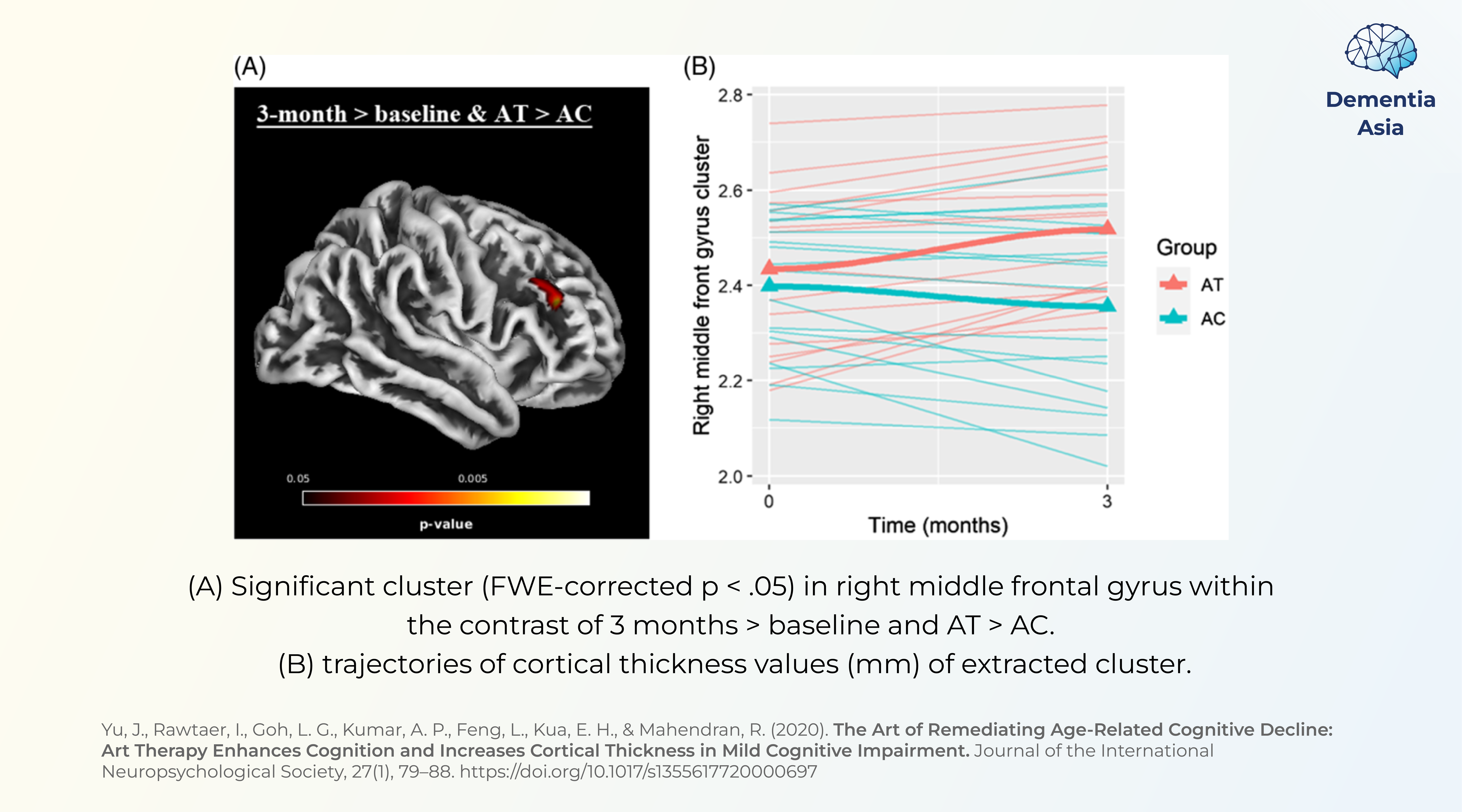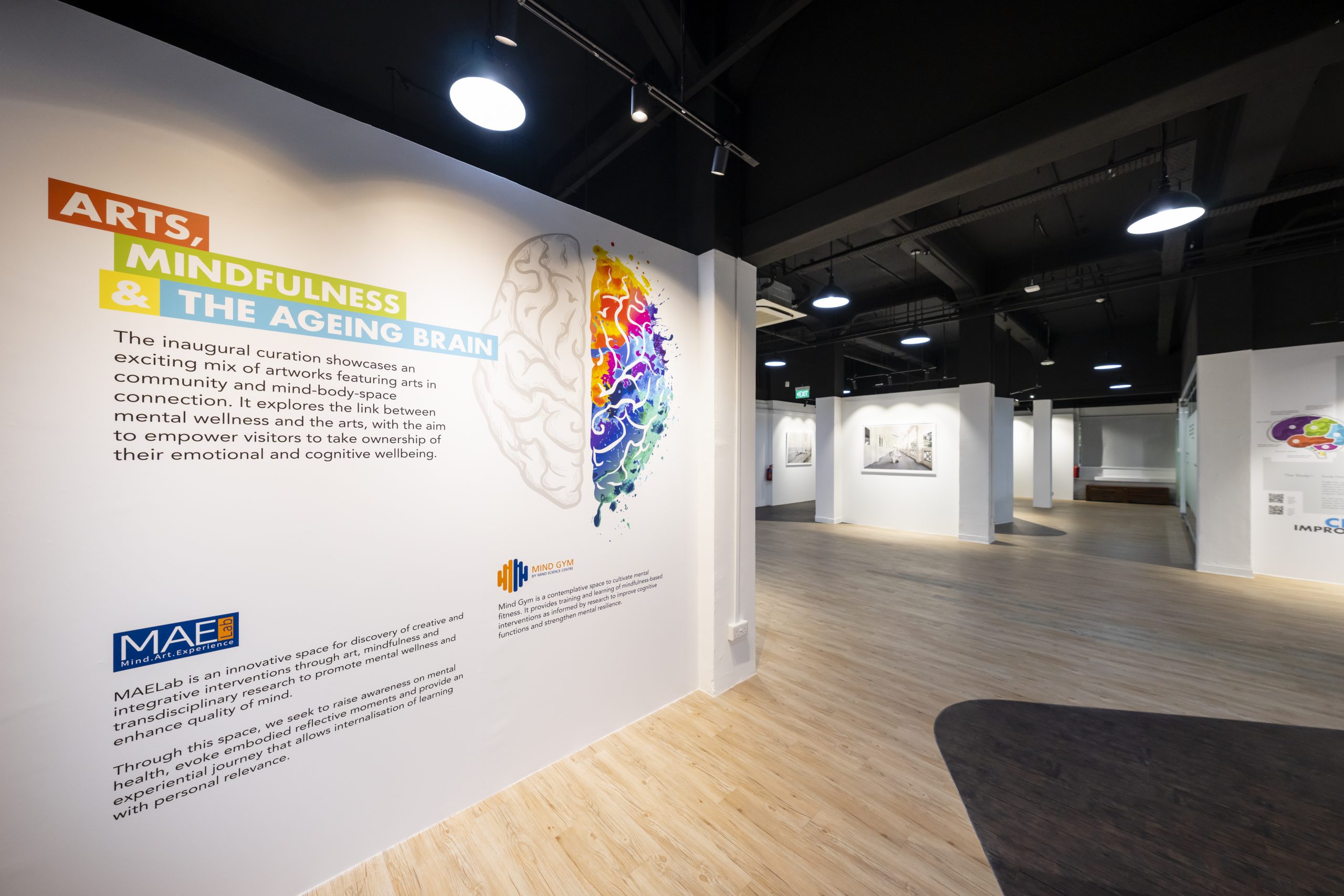Art Therapy to Prevent Cognitive Decline

With the increasingly greying population in Singapore, the prevalence of mild cognitive impairment (MCI) and comorbidity of conditions are expected to rise at a rapid pace. Given that dementia is irreversible and has no known cure at this current stage, conventional non-pharmacological methods have shown to be promising in slowing down and managing symptoms of progressive cognitive decline.
One such area is Art Therapy (AT), with a body of evidence manifesting its engagement on cognitive functioning as well as how it can contribute to the lives of people living with dementia.
What is Art Therapy (AT)?
Art therapy is a therapeutic process involving both art and psychotherapy elements as a means of channelling well-being outcomes through a creative approach. Deliverables can include an umbrella of activities including but not limited to: visual art-making, museum gallery viewing, knitting, clay-art, photography and art or music with reminiscence themes to evoke memory for elderly with dementia.
Evidently, as art therapy occur through different mechanisms, on a bio-psycho-social level, it is increasingly recognised as a preventive strategy for further cognitive decline.
Art Therapy (AT) Research at Mind Science Centre
The benefits associated with art therapy have been robust, so far, however, there remains a paucity of discussion from the local scholarly community. For the purpose of addressing these gaps, researchers from the Mind Science Centre have carried out the Art Therapy (AT) study.
Community-living older adults in Singapore aged 60 to 85 years with Mild Neurocognitive Impairment were recruited for the study, which was carried through over a period of 9 months. Interventions were led by trained therapists in 45-minute sessions weekly for the first three months, then fortnightly for six months.
The study design, an open-label, parallel randomised controlled trial incorporated three arms (two interventions and one control). Namely, the Art Therapy (AT), Music Reminiscence Activity (MRA) and a control arm (Mahendran et al., 2018).
Intervention-blinded assessors were done at baseline, at three and nine months respectively. This included neuropsychological tests of various cognitive domains (memory, attention, and visuospatial abilities), neuroimaging scans of the brain, psychological well-being assessments with questionnaires and measurement of telomere length as a biological marker for cellular ageing.
Interventions Implemented on Older Adults with MCI
Art Therapy (AT) constitutes two components;

Foremost, art pieces were selected by curators from the National Gallery and the National University of Singapore Museum, who developed the activity sessions in consultation with the study team, involving psychiatrists and therapists. The emphasis was on the relevance of the artworks to the elderly, in terms of themes and events from the country’s past. Guided viewing and cognitive evaluation of artworks at the respective sites was conducted as a group activity by trained staff and involved narration of thoughts and inner experiences.
Following up with visual art production as the second component, which included physical creation of themed artwork (e.g. family, relationships) using a variety of materials to create drawings, collages, symbol work or clay sculptures. Subsequently, image appreciation activities were conducted to gain insights and discuss feelings about the pieces that were produced.
Music Reminiscence Activity (MRA);
It involved listening to and recalling memories and experiences related to the music that the therapist has selected. Photographs and video clips were prepared to accompany the music for discussion purposes. Through MRA, shared feelings were fostered as the group process provided validation.
Control Group (CG);
No interventions were given but life continued as usual for them.
Significant Gains in Memory Following Art Therapy
For the Art Therapy (AT) arm, improvements were noted in the neurocognitive domains compared to the control group at 3 months and were sustained at 9 months.
Significant gains in memory domains, of immediate memory and working memory span were observed. Improvements in subsyndrome depression and anxiety scores were ascertained at 3 and 9 months compared to the baseline.
Neuroimaging findings also showed a significant increase in cortical thickness, relative to the controls.
The Art Intervention that was delivered embodied rigorous cognitive involvement resulting in brain changes associated with significant cognitive gains. Importantly, it is an easily sizable intervention and can be readily delivered to older adults in the community (Kua and Mahendran, 2022).
Learn More through Our Exhibition
Mind Science Centre curated an exhibition titled “Arts, Mindfulness and the Ageing Brain”, presented at our Mind Art Experiential Lab (MAELab) located at Alexandra Hospital.
The curation addresses ageing as inevitable but helps inform viewers to have control over how they age. It showcases local research evidence on how lifestyle changes one can engage in as interventions to mitigate the effects of ageing. The viewers can learn about how they can prevent cognitive decline and improve their brain health through art, mindfulness, and tea drinking.
References
KUA, E. H. & MAHENDRAN, R. 2022. Ageing with dignity : a 10-year study on positive ageing and dementia prevention in Singapore Singapore, Write Editions,.
LEE, R., WONG, J., SHOON, W. L., GANDHI, M., LEI, F., KUA, E., RAWTAER, I. & MAHENDRAN, R. 2019. Art therapy for the prevention of cognitive decline. The Arts in Psychotherapy, 64, 20-25.
MAHENDRAN, R., GANDHI, M., MOORAKONDA, R. B., WONG, J., KANCHI, M. M., FAM, J., RAWTAER, I., KUMAR, A. P., FENG, L. & KUA, E. H. 2018. Art therapy is associated with sustained improvement in cognitive function in the elderly with mild neurocognitive disorder: findings from a pilot randomized controlled trial for art therapy and music reminiscence activity versus usual care. Trials, 19, 1-10.
PETERSEN, R. C. 2004. Mild cognitive impairment as a diagnostic entity. Journal of internal medicine, 256, 183-194.
YU, J., RAWTAER, I., GOH, L. G., KUMAR, A. P., FENG, L., KUA, E. H. & MAHENDRAN, R. 2021. The art of remediating age-related cognitive decline: art therapy enhances cognition and increases cortical thickness in mild cognitive impairment. Journal of the International Neuropsychological Society, 27, 79-88.

